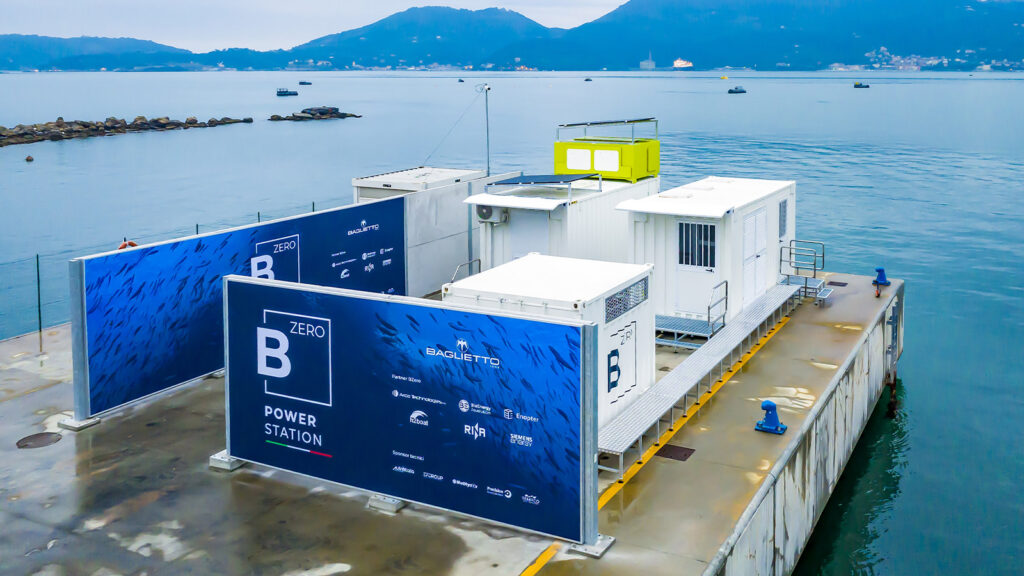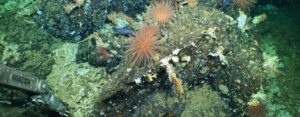Update on Baglietto prototype green hydrogen system

Baglietto, the Italian boatbuilder based in La Spezia, has outlined the latest developments of its prototype green hydrogen system at a conference entitled ‘Bzero – working for an evolving future’.
The Bzero project, which was presented as a preview last year in Monaco, is based on the use of green hydrogen as a new energy source. The system prototype is now being developed, and an identical, though smaller-scale, one will then be installed on Baglietto yachts over 50m in length.
The boatbuilder says this prototype will be used to develop operation procedures, optimise technical solutions, and obtain the certifications required to use the system on board yachts and refill the tanks, either independently or from an external source. The power station also partially contributes to the shipyard’s energy production cycle.
Baglietto specialises in the construction of new planing aluminium yachts ranging between 38 and 50 metres in length and steel and aluminium displacement mega-yachts above 40 metres.
“The Bzero project once more testifies to Baglietto’s pioneering approach, our strong commitment to greener and increasingly sustainable yachting, and our active role in the ongoing inescapable energy transition process,” says Baglietto’s CEO, Diego Michele Deprati. “The Bzero power station presented yesterday is the promise we have delivered on … We have set up a department, Baglietto Energy, specifically devoted to studying new eco-sustainable technology and the implementation of alternative energy sources in the boating industry.”
Baglietto’s sales director, Fabio Ermetto, adds: “The Bzero project is an important journey into future knowledge. Indeed, yachts equipped with this technology can be expected to produce zero emissions up to 75 h at anchor and have a range of up to 20 nautical miles at a speed of 7 knots. The combination of hydrogen and batteries will result in four times more available energy than that ensured by current batteries, which will also mean great savings for the owners”.
“The project, whose primary objective is to increase the cruising range of the boat in the electric, zero-emission, navigation mode,” says Alessandro Balzi, director of the shipyard’s energy department, “is based on the installation of hydrogen fuel cell technology on a hybrid or diesel-electric platform on board Baglietto yachts. The special storage system allows trapping hydrogen, which by nature takes up large volumes, in metal hydrides, thereby making it possible to store it in the solid form and at low pressure”.
Together with project leader Baglietto, six international partners are taking part in the project. Each partner has design and development teams based in Italy: Arco Technologies, Bluenergy Revolution, Enapter, H2boat, Siemens Energy and RINA, as the certifying body across all project stages.
Besides RINA as the main partner, technical sponsors of the event were AutroItalia, Methydor, Precision Fluid Control, and Tempco.
The Bzero system
The Bzero system is based upon a hydrogen production module, which uses filtered and deionised sea water to produce hydrogen with 5.0 purity grade at a maximum pressure of 35 bar thanks to AEM-type electrolysers, developing an overall power of approx. 55 kW.
Electrolysers are primarily powered by energy from renewable sources (solar panels) and/or the shore power grid, so as to produce as much ‘green’ hydrogen as possible. The hydrogen thus produced is then stored in the solid state inside metal hydride cylinders (MH storage) at low pressure (35 bar, compatible with storage) and room temperature.
The process of storing and releasing the hydrogen from the hydrides is managed by a ‘thermal management’ system allowing to heat up (during hydrogen discharge) and cool down (during charging) the metal hydrides. The thermal energy required comes from the heat produced by the PEM-type fuel cell module (approx. 200kW), which uses hydrogen as fuel to produce zero-pollutant and zero-noise electricity. The electricity produced by the system is controlled by a DC/DC converter installed on a central 700V DC bus previously tested on Baglietto’s hybrid technology yachts.
A set of lithium-ion batteries, connected to the same bus, in parallel with the fuel cell, is in charge of absorbing energy demand peaks and troughs on the user’s side.











